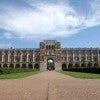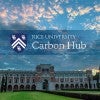
US News grad school rankings give high marks to Rice programs
A total of 19 graduate programs at Rice University rank among the nation's top 25 in their categories in the latest edition of U.S. News and World Report’s “Best Graduate Schools.”

US News grad school rankings give high marks to Rice programs
A total of 19 graduate programs at Rice University rank among the nation's top 25 in their categories in the latest edition of U.S. News and World Report’s “Best Graduate Schools.”

Rice’s Doerr Institute for New Leaders unveils new elective classification, resource community
Leadership education and development proponents have two new ways to elevate their commitment to developing skills students need to become leaders: the Carnegie Elective Classification in Leadership for Public Purpose (LPP) and HigherLed, a digital resource community.

Rice's spectacular new opera hall to open with public events including community day, 'Don Giovanni'
As performance halls around the world open their doors again in the wake of the COVID-19 pandemic, Rice University's Shepherd School of Music will officially open the new Brockman Hall for Opera with a series of public events scheduled for next month.

Adrienne Correa wins CAREER Award
Rice marine biologist Adrienne Correa has won a prestigious CAREER Award from the National Science Foundation.

Giving teams autonomy optimizes creativity, report says
A new paper from Rice Business incorporating decades of research offers insights on the best way to design innovative teams.

Rice announces tuition for 2022-23 academic year
Undergraduate tuition for the 2022-23 school year will be $54,100, an increase of $2,030 over the current year. The total cost, including $15,000 for on-campus room and board and $863 in mandatory fees, will increase 3.5% to $69,963.

Don’t underestimate undulating graphene
A theory by Rice University scientists suggests putting graphene on an undulating surface stresses it enough to create a minute electromagnetic field. The phenomenon could be useful for creating 2D electron optics or valleytronics devices.

More hospital price transparency needed to slow rising costs, says Baker Institute report
The rising costs of hospital care -- among the major contributors to rising health care costs as a whole -- can be alleviated by requiring hospitals to be more transparent on the prices of their services, according to a new report from Rice University’s Baker Institute for Public Policy.

Wind, solar could replace coal power in Texas
A fraction of the wind and solar projects already proposed in Texas could eliminate the state’s remaining coal power plants and their emissions, according to Rice University engineers.

Germaine Franco ’84’s score for Disney’s “Encanto” is the music everyone is humming right now.

Thomas Senftle wins NSF CAREER Award
Rice University chemical and biomolecular engineer Thomas Senftle has won a National Science Foundation CAREER Award to advance machine learning techniques for designing new catalysts.

Run not just fun for Rice students, elementary partners
Getting out and mentoring elementary students in physical fitness turns out to be just as beneficial for college students, Rice University study finds.

Energy experts to discuss state of oil market after Russian sanctions
With global oil markets in turmoil and gasoline prices soaring around the world, an upcoming event hosted by Rice University’s Baker Institute for Public Policy will highlight how economic sanctions on Russia will affect everything from the cost of a barrel of oil to the price of gas at the pump.

Saudi Aramco joins Rice University’s Carbon Hub
Saudi Aramco joins Rice’s Carbon Hub research initiative to accelerate the energy transition by developing sustainable uses of hydrocarbons.

Rice experts available to discuss how alternative energy can ease foreign oil dependence
Amid Russia's war on Ukraine, Rice University experts are available to discuss how alternative energy sources could ease the United States' dependence on foreign oil.